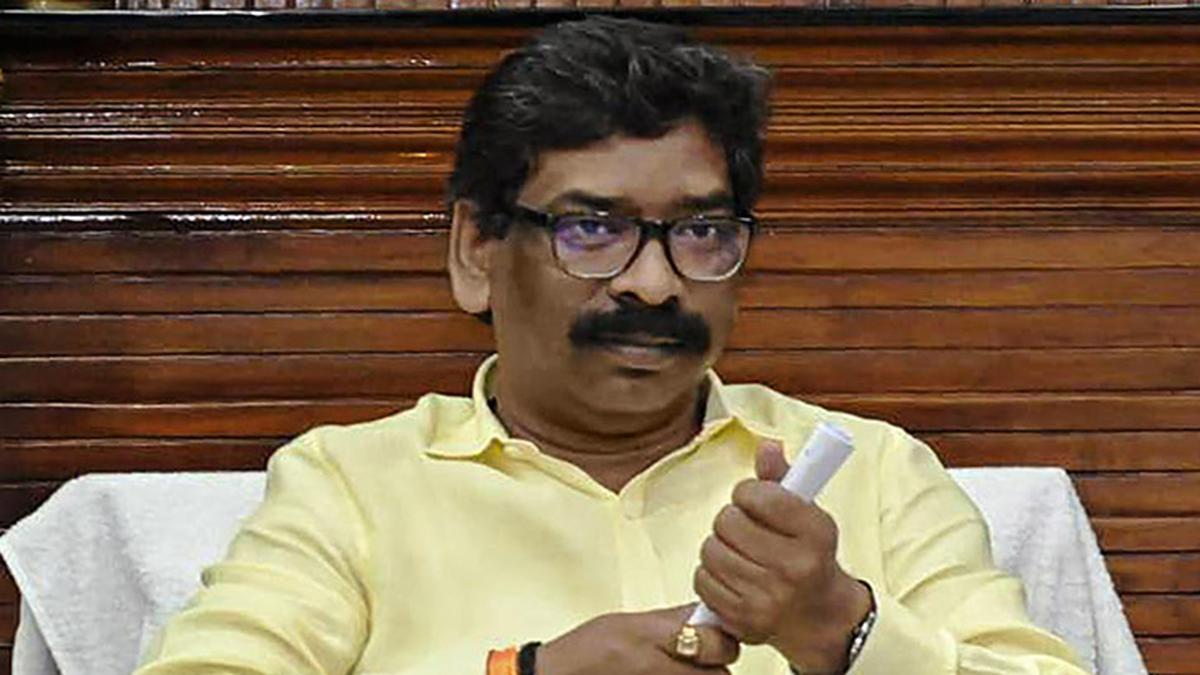
The call for the withdrawal of Jharkhand’s new “60-40” recruitment policy, being opposed everywhere in the State by student unions, shows no sign of abating. While ‘60-40 Nai Chalto’ campaigns continue on social media, their influence is also seen in protests ranging from the ‘Assembly gherao’ and the Chief Minister’s residence ‘gherao’, and in the calls for a Jharkhand bandh twice in the past two months.
On March 3, 2023, the Jharkhand Government reserved 60% of government jobs for aspirants from the State, leaving the remaining 40% open to all. Angry students allege that locals have been neglected by the new policy.
For the State government led by Chief Minister Hemant Soren, the issue has posed to be an escalating problem. For the Bharatiya Janata Party (BJP), which opposed the recruitment policy in the previous Budget session too, it’s part of the political agenda.
Student organisations are demanding the 1932 Khatiyan (land settlement)-based policy be applicable. In November 2022, the Jharkhand Government passed a Bill in the State Assembly making the land records of 1932 as the criteria for verifying domicile in the State for the recruitment policy.
However, the former Governor of Jharkhand, Ramesh Bais, returned the Soren government’s 1932 Khatiyan Bill. The Governor asked the State government to review the policy. The Governor also said the legality of the Bill had to be scrutinised seriously, and to ensure it conformed to the Constitution and the directions of the Supreme Court.
In the Bill approved by the Soren government in both Houses, locals are defined as residing within the territorial and geographical limits of Jharkhand and are citizens of India. Their forefathers’ names have to be recorded in the survey/Khatian of 1932 or earlier. Moreover, only local people identified under this legislation were entitled to Grade 3 and Grade 4 government jobs in the State. The “60:40” policy, however, does not feature this provision.
Moreover, upon the review of the Bill, it was found that all citizens had equal rights to employment under Article 16 of the Constitution.
“According to Clause (3) of Article 16 of the Constitution, only Parliament has the right to impose any kind of condition in the case of employment under Section 35 (A) as a special provision. The State Legislature does not have this power. The Bill is contrary to the provision of the Constitution and the order of the Supreme Court, “ Ravi Kumar Singh, Supreme Court advocate, said.
“The Supreme Court, in the case of Satyajit Kumar Vs. State of Jharkhand, had declared the 100% reservation given by the State in scheduled areas as unconstitutional. Such a provision clearly appears to be inconsistent and having adverse effect on the fundamental rights provided in Articles 14, 15, 16 (2) of Part III of the Constitution of India, which are enshrined in Article 13 of the Constitution,” Mr. Singh added.
It has been 22 years since the formation of the State and a recruitment policy has been mooted thrice but cancelled each time by the Jharkhand High Court on grounds of unconstitutionality.
A recruitment policy was created for the first time under the leadership of former Chief Minister Babulal Marandi but it was struck down by the Jharkhand High Court as flawed. Later, in 2016, the Raghubar Das government drafted a recruitment policy that divided 13 districts of the State into ‘scheduled areas’ and 11 districts into ‘non-scheduled categories’. This too was struck down after a long legal battle. In 2021, Mr. Soren’s recruitment policy, which was made after rejecting the policy helmed by Mr. Das, too was withdrawn upon the direction of the Jharkhand HC following a protracted legal battle.
“This is not a serious issue at all and there is a lot of confusion among the students’ unions. Without having much thought, they are making it an issue unnecessarily. As far as the Bill being returned by the Raj Bhavan is concerned, the State government will make a fresh attempt,” senior Jharkhand Mukti Morcha (JMM) leader Supriyo Bhattacharya said, when asked about the continuing agitation and its implications.
Devendra Mahto, the leader of Jharkhand State Students’ Union (JSSU), an umbrella body of different student unions, alleged that the State government had turned dictator. “The government of Hemant Soren is not paying any attention to the locals of Jharkhand and people of other States are looting our jobs, which is not acceptable at all. We will continue our agitation until we get justice,” Mr. Mahto said.
"lasting" - Google News
June 17, 2023 at 09:55PM
https://ift.tt/oeaTF6d
The unpopularity of Jharkhand’s new recruitment policy could have lasting political ramifications - The Hindu
"lasting" - Google News
https://ift.tt/WhIz2Mr
Shoes Man Tutorial
Pos News Update
Meme Update
Korean Entertainment News
Japan News Update
Bagikan Berita Ini














COMMents